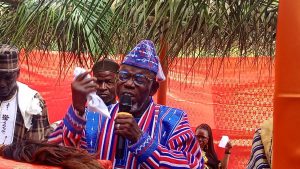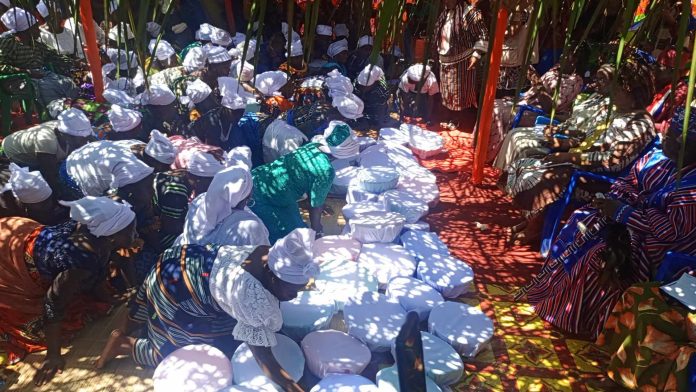It was a beautiful yet sorrowful moment in Gbanquio Town, Tappita District, Nimba County when hundreds of thousands of traditional women guided by the National Council of Chiefs and Elders officially closed the Sande Society Particularly enforcing the Ban on Female Genital Mutilation (FGM) practice in that region of Liberia.
Tears rolling down the traditional zoes’ faces displayed how unhappy they were despite turning over their traditional properties in line with the ban imposed by the National Traditional Council Chairman Chief Zanzan Karwor
The traditional zones, beautifully dressed, marched from their ritual zone with several bundles of FGM tools and gave their burden to Chief Zanzan Karwor painfully obeying their traditional mandate aimed at terminating the FGM portion of the traditional practices in the twenty chiefdoms that operate FGM ritual in Nimba County.
The ceremony organized by Liberia’s National Council of Chiefs and Elders in collaboration with the Ministries of Gender, Children and Social Protection, Internal Affairs, Embassy of Sweden, and UN Women Country Representative, Ms. Comfort Lamptey was witnessed by scores of Government officials, traditional chiefs and elders, and the country traditional queen Julie Endee among others.
During the closing ceremony, the National Traditional Chiefs and Elders Council Chairman, Chief Zanzan Kawor, stated that the traditional Sande brushwood is a place of training and discipline other than what has been perceived to be disrespectful nature despite the practice of FGM something that the NTCECL has banned and closing across the country with demand to include Grand Bassa Bush School.
Our Bush Is Not A Place Where Young Girls Are Spoiled To Disrespect Their Fathers, Mothers and Their Husbands.
“As The Head For All The Traditional Chiefs, I represent the indigenous people in this country,
In February 2023, when I single-handedly banned the Pratrice of FGM, all you you my traditional people listened to me and didn’t find me; it’s because of the way we were trained and our traditional but I say I am sorry ya,
Today, I bring you all my people a message; People talking about Sande, Sande is the area for you to train your child to respect the father and mother. This is the area our daughters come from and do not disrespect their mothers and fathers”.

Chief Zanzan Kawor’s remarks followed the official turning over of a Livelihood Support Center that will be used by the twenty chiefdoms to further train young girls and women in the production of basic livelihood materials as a means to empowering the traditional people conceding the final closure of FGM activities within the region.
In remarks, Liberia’s Traditional Queen and Co-Chair on the elimination of FGM, Juli Endee, being overwhelmed by the numerous challenges reaching the zenith of the elimination of all FGM activities in Traditional ritual extended thanks and appreciation to UN women, the Government of Sweden, in particular, the Ministry of Gender, Ministry of Internal Affairs for their financial and technical support achieving such milestone.
“This is a very difficult process, to entirely leave what you have been doing for years within a few months or time is a very difficult and challenging thing to do as a traditional person.
But, some of us know that when you put your signature to a document when you say I will do this, you must be committed,” Madam Endee said.
Nonetheless, madam Endee encouraged Zoes to stick to what they say they will do, no matter the challenges and difficulties they may face but urged them not to return to the harmful practice of FGM noting that traditional people, can’t go back to their words. “What we say we’ll do is what they will do”.
Meanwhile, UN Women Country Representative Comfort Lamptey saluted the traditional zoes’, elders, and chiefs for embracing the courage of change into a segment of the traditional practices, particularly the FGM.
“I want to say a big thank you for the bold step you have taken today.
Madam Lampety stressed that the step taken by the Zoes to change their culture is not easy maintaining that the change they are pursuing is change not just for them, but for their children and generation to come and a change to make Liberia better.
“This change will build a healthier Liberia where all Liberians, including women and girls, can fulfill their full potential in society”.




